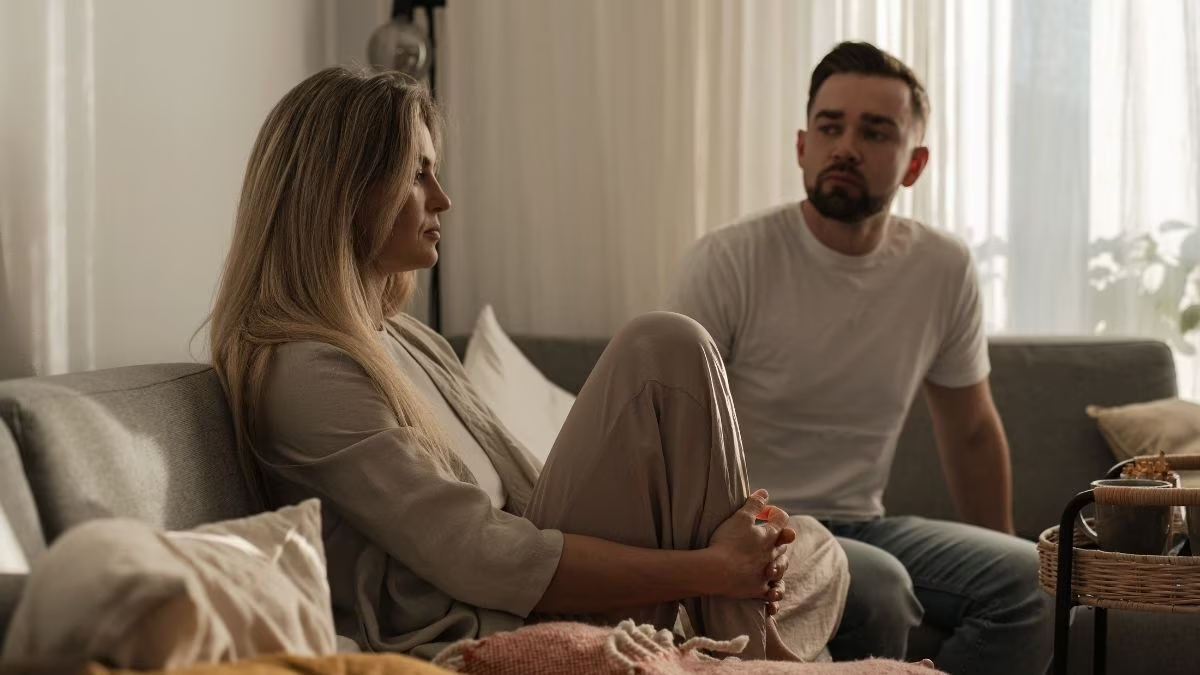hen relationships hit a rough patch, it’s natural for couples to feel uncertain, frustrated, or even a little lost. Small misunderstandings can often grow into bigger conflicts, and trust or intimacy may start to feel fragile. In times like these, it’s common to ask: Can marriage counseling help us strengthen our relationship?
If you’ve asked yourself or your partner this question before, you are not alone. Every couple experiences moments of distance, misunderstanding, or uncertainty in their relationship, and reaching out for help doesn’t mean your relationship is broken; it means you’re invested in making it stronger.
Marriage counseling, also called couples therapy, provides a safe and supportive space to explore challenges together, rebuild connection, and learn strategies and tools for communicating in ways that bring you closer.
So does marriage counseling really work? In this article, we’ll take a closer look at this question and dive even deeper into the following:
- What marriage counseling is and when is the right time to start
- Key therapeutic models used in marriage counseling
- What to expect from a typical marriage counseling session
- Differences between in-person and online marriage counseling sessions
- How successful is marriage counseling really?
- Answers to the most frequently asked questions about couples therapy and its efficacy
What is Marriage Counseling, and When Should You Go?
Marriage counseling is a specialized form of therapy that focuses on the unique dynamics of romantic relationships. Unlike individual therapy, which focuses on addressing the challenges of just one person, marriage counseling is a shared space where both partners can explore how they connect, communicate, and support one another.
Marriage counseling allows couples to explore patterns, understand each other’s perspectives, and develop practical tools to communicate more effectively.
So, when is the best time to go for couples therapy? Some couples wait until difficult times to get help, such as after a breach of trust, repeated arguments, or major life changes. But others proactively attend sessions to strengthen their relationship before issues arise or escalate.
Engaging in therapy as a preventive measure can improve communication, reduce misunderstandings, and provide strategies for handling stress as a team, so that when tough times do arise, the couple is well prepared.
Guided by a licensed therapist, relationship coach, or psychologist trained in relationship dynamics, marriage counseling provides a safe space for couples to examine patterns and cycles that drive their interactions. They learn evidence-based techniques to rebuild trust, resolve conflicts constructively, and deepen emotional closeness. Over time, this structured support can help couples not only solve existing challenges but also create a foundation for continued long-term growth and stability.
What Are the Main Therapeutic Models Used in Marriage Counseling?
Couples therapy isn’t a one-size-fits-all solution. Every relationship is unique, and therapists draw from different approaches depending on their training, the couple’s needs, and the challenges and goals at hand when starting with a new couple. Understanding the main types of therapy can help you feel more confident about the process and what to expect in your sessions.
Here are some of the most widely used approaches, along with examples of how they might feel in practice:
What Typically Happens During a Marriage Therapy Session?
If you’ve never attended marriage counseling before, you might wonder what actually happens during a session. Here’s a step-by-step overview of the typical process:
1. Intake and Assessment
The therapist begins by gathering background information about each partner, including relationship history, major concerns, and personal goals. Both partners may also fill out questionnaires to assess communication styles, attachment types, or conflict triggers.
2. Identifying Goals
Together with the therapist, the couple will define clear, measurable goals. For example, these might include “reducing arguments,” “rebuilding trust,” or “improving intimacy.” This helps couples track progress and stay motivated during the process.
3. Exploring Relationship Patterns
The therapist will observe how you interact with each other and will help identify negative cycles that may be holding you back in your relationship. Recognizing negative patterns is the first step to changing them and creating healthier ways of relating to one another going forward.
4. Communication Exercises
Many sessions include structured exercises designed to improve listening, empathy, communication, and conflict resolution. Examples include:
- Active Listening: Each partner repeats what they heard before responding to ensure understanding.
- “I” Statements: Replacing “You never…” with “I feel…” to reduce defensiveness and encourage openness.
- Conflict De-escalation Techniques: Using pauses, deep breathing, or time-outs during heated moments to prevent escalation.
5. Homework Assignments
Between sessions, couples are often given exercises to practice at home. This can include a range of activities, including journaling feelings, scheduling weekly check-ins with one another, proactively finding moments to express appreciation towards each other, or practicing communication techniques learned in therapy sessions. These tasks help reinforce positive changes outside of therapy and help contribute to long-term success.
6. Progress Review
Sessions typically end with a reflection on what worked, what didn’t, and what needs more attention next time. Regularly reviewing progress helps maintain momentum and provides encouragement as couples notice improvements in their relationship.
Remember: change is a process. Some sessions may feel more challenging or emotional, while others are lighter and more practical. Progress isn’t always linear, but consistent effort and openness are crucial in helping you make meaningful changes and lasting growth.
How Does Online Marriage Counseling Compare to In-Person Therapy?
The rise of online therapy has made marriage counseling more accessible and more affordable than ever. But how does it compare to in-person therapy sessions? In the following chart, we break down key differences between the two models.
So, which type of couples therapy is better? That depends on you. Both formats can be very effective if both partners are engaged and willing to put in the work. Online counseling may be particularly beneficial for couples with busy schedules, budget constraints, or for couples in long-distance relationships.
Ultimately, the choice depends on your lifestyle and what works best for you as a couple. And of course, in the end, what matters most is that you and your partner are committed to the process.
How Successful is Couples Therapy, Really?
Marriage counseling can sound promising, but it’s natural to wonder: Does couples therapy actually work?
The short answer is yes. Research shows that around 70% of couples who take part in couples therapy report noticeable improvements in communication, emotional connection, and overall relationship satisfaction.
That said, couples therapy is not a quick fix or a magic solution. What truly makes it work is a combination of factors, and its success depends on more than just attending sessions.
Commitment from both partners to actively participate in sessions and home assignments is essential, as is honesty in sharing feelings, fears, and frustrations.
Equally important is the fit with the therapist. Working with someone you feel comfortable with can make difficult conversations feel safer and more productive.
And of course, consistency matters too. Attending sessions regularly and practicing the tools and exercises you learned in between meetings reinforces positive patterns.
Finally, having realistic expectations is very important when it comes to overall success. Setting realistic goals helps couples approach therapy as a process of understanding and growth, rather than a quick fix to their problems.
When couples can work within these parameters, marriage counseling can do more than just resolve conflict; it can help partners break negative cycles, strengthen their emotional intimacy, and develop healthier ways of supporting each other for the long term.
FAQs About Marriage Counseling
Does marriage counseling work for most couples?
Yes, marriage counseling works for many couples, especially when both partners are committed and motivated to put in the time and effort during sessions and between sessions.
What is the average success rate of couples counseling?
Studies show that 70–75% of couples report improved satisfaction and communication after couples therapy, depending on various factors like therapist expertise and fit, the therapy model, and the couple’s engagement.
How successful is marriage counseling for serious issues like infidelity or abuse?
Marriage counseling can help couples work through trust issues from infidelity, but like with all therapy, success depends on accountability, forgiveness, and consistent effort.
For cases of abuse, therapy should focus first and foremost on safety. In cases of ongoing violence, couples therapy is not recommended until individual safety is established.
How long does marriage counseling take to show results?
Many couples notice changes within a few weeks, but it often takes longer (about 8-20 sessions) for couples to see meaningful change. Lasting results come from consistent participation and practice between sessions.
How many therapy sessions do couples typically need?
The number of sessions ranges, but most couples attend between 8 to 20 sessions, though this varies based on the severity of their issues and their therapy goals. Research shows that nearly 65% couples therapy cases are completed in 20 sessions, and nearly 88% are completed after 50 sessions.
How does online marriage counseling compare to in-person therapy?
Online marriage counseling can be just as effective as in-person therapy for most couples. It’s especially useful for long-distance relationships, budget-conscious couples, or those with busy schedules.
What factors make marriage counseling more likely to succeed?
Key success factors for marriage counseling include:
- Willingness from both partners to put in the work
- A good therapist-couple fit
- Regular attendance at therapy sessions and commitment to working on reinforcing tools and lessons learned at home
- Openness to feedback and vulnerability
Can we do marriage counseling if one partner is reluctant or unwilling?
Yes. But it’s important to note that progress may be slower if only one partner is present. Some therapists offer individual sessions to help the willing partner build insight and model positive change, which can often motivate the other to join later.
What are some common misconceptions about marriage counseling?
Many people have many preconceived notions and misconceptions about marriage counseling. Below, we will clear up some of the most popular myths.
Misconception 1: Marriage counseling is only for couples in crisis
Fact: Many couples seek counseling proactively—not just because something is “wrong.” Couples often engage in therapy because they want to strengthen communication, rebuild intimacy, or prevent future issues. Preemptive counseling can be just as valuable as therapy during challenging times.
Misconception 2: Counseling is a quick fix
Fact: Therapy is a process, not an instant solution. Changes in communication patterns, trust, and emotional closeness take time, practice, and commitment from both partners. Consistency and effort outside the sessions are often what make therapy effective.
Misconception 3: One partner has to be “the problem”
Fact: Relationship challenges are rarely caused by just one person. Counseling focuses on the dynamics between both partners and how each contributes to patterns of misunderstanding, conflict, or emotional distance.
Misconception 4: Therapy means the marriage is failing
Fact: Seeking help doesn’t signal failure - it’s a sign of investment. Couples who attend therapy often strengthen their connection and learn skills that can help prevent problems from escalating in the future.
Final Thoughts: Is Marriage Counseling Right for You?
Marriage counseling isn’t just something to turn to when things get hard. It's an opportunity to invest in the health, happiness, and longevity of your relationship before major issues arise.
Whether you’re facing communication breakdowns, struggling to rebuild trust after a conflict, or simply looking to deepen your connection, couples therapy offers a structured, supportive space where both partners can be heard and understood, and where meaningful change can happen.
Through counseling, couples gain practical communication skills for navigating disagreements, learn new ways to express love and appreciation, and uncover patterns that may have been holding their relationship back. Progress may not happen overnight, but every step, even small ones, helps contribute to lasting growth.
Taking the first step to start marriage counseling can feel daunting, but it’s also the moment where real change begins. Choosing to invest in your relationship shows that you value your partner and your shared future. With commitment, openness, and guidance from a skilled therapist, couples can transform challenges into opportunities for growth, understanding, and deeper intimacy.
If you’re ready to strengthen your connection, improve communication, and build a relationship that feels more supportive and fulfilling, OurRitual offers compassionate, research-backed support. Schedule your first session today and start your journey toward a stronger and healthier relationship.
























